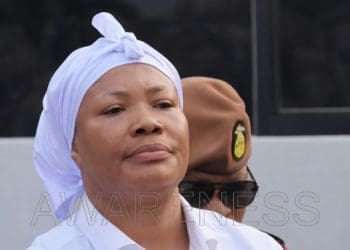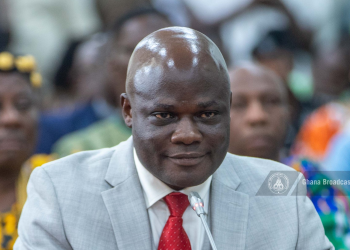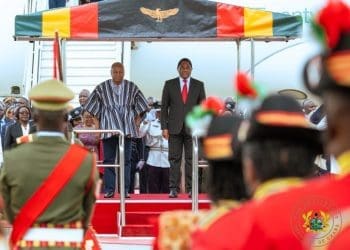Ghana’s innovative Gold-for-Oil (G4O) Programme has emerged as a critical policy tool in securing petroleum imports at competitive prices, easing pressure on the foreign exchange market, and helping stabilise ex-pump fuel prices in a period of global uncertainty.
Launched in 2022, the programme has so far utilised 27.63 tonnes of gold to settle payments for 1.95 million metric tonnes of petroleum products, providing much-needed relief to consumers and shielding the economy from the worst effects of volatile oil markets.
A market-based solution to a fuel price crisis
The Gold for Oil initiative is an extension of the Bank of Ghana’s Domestic Gold Purchase Programme (DGPP), which was introduced to rebuild gold reserves and strengthen the cedi during one of the most challenging economic periods in decades.
Speaking at Converge ’25 — Africa’s premier trade banking event in London — First Deputy Governor of the Bank of Ghana, Dr. Zakari Mumuni, described the DGPP as “a lifeline” when domestic ex-pump petroleum prices had surged by as much as 230% in a single year, driven by soaring global crude oil prices.
Before the G4O intervention, petroleum imports topped Ghana’s commodity import bill, placing immense pressure on the country’s limited foreign exchange reserves.
$480m needed to import fuel each month
Ghana required $480 million each month to import petroleum products.
Dr Mumuni said Gold For Oil was a well-intended policy solution to moderate the adverse effects of escalating domestic ex-pump petroleum prices.
The policy leveraged the DGPP framework to supply foreign exchange and gold for petroleum imports through government-to-government arrangements, moderating price shocks that would otherwise have rippled through transportation costs and general inflation.
Dr Mumuni pointed out that the G4O intervention helped secure petroleum imports at competitive prices, easing pressure on the forex market and stabilising ex-pump petroleum prices.
“This moderated the volatile ex-pump price pass-through effects on transport costs, and in turn, inflation.
“This is a clear example of how commodities can be used as instruments of liquidity and trade facilitation in our economy — not just as sources of export earnings,” Dr. Mumuni said.
How the Gold for Oil programme works
According to the government’s G4O policy framework, payment for petroleum supplies is executed through two main channels: barter trade and broker-assisted forex conversion.
Barter channel
Oil suppliers willing to accept gold directly receive the equivalent volume from the Bank of Ghana.
Both BoG and the International Oil Trading Companies open gold metal accounts in an agreed refinery.
Gold is transferred based on shipment invoices and quality certification from the Bulk Oil Storage and Transport Company (BOST).

Broker channel
BoG sells gold to an accredited broker, who provides foreign exchange cover to pay for petroleum shipments.
The broker deposits the proceeds into BoG’s gold holding account, from which payment is made into an escrow account upon confirmation of delivery.
GH¢2.1bn Forex losses in 2 years
BoG suffered cumulative foreign exchange losses of GH¢2.1 billion over the past two years as a result of its participation in the government’s ambitious Gold For Oil programme.
From GH¢317 million in 2023, the losses ballooned to GH¢1.82 billion in 2024.
As of December 31, 2024, the BoG had committed a seed capital of GH¢4.69 billion to support the Gold for Oil programme.
Following the change of leadership, BoG suspended the Gold For Oil initiative
The DGPP: Building the reserve base
The Gold for Oil policy is anchored in the Domestic Gold Purchase Programme, under which the BoG buys unrefined “dore” gold from licensed aggregators.
Each batch is assayed by the Precious Minerals Marketing Company (PMMC), priced using international benchmarks and the prevailing cedi-dollar rate, and paid for within 48 hours.
The gold is stored in BoG vaults before being refined to London Bullion Market Association (LBMA) standards of 99.99% purity.
A second supply channel — an agreement with the Ghana Chamber of Mines — ensures the central bank purchases 20% of all refined gold output from member companies at market rates.
145.95 tonnes of gold purchased since 2021
Thanks to these measures as of the end of June 2025, the BoG had purchased 145.95 tonnes of gold under the programme.
86.77 tonnes sold to raise forex
A total of 86.77 tonnes has been sold to raise foreign exchange for bolstering reserves and supporting the cedi.
27.63 tonnes used for Gold for Oil
This, combined with the deployment of 27.63 tonnes of gold for the importation of 1.95 million metric tonnes of petroleum products under the complementary Gold for Oil (G4O) initiative, has had far-reaching effects — from moderating fuel prices to curbing inflationary pressures.
34.40 physical gold holdings
As of the end of July 2025, the BoG’s physical gold holdings had surged to 34.40 tonnes, up from just 8.74 tonnes in mid-1960s.
Historical context: A return to gold reserves
Ghana’s reliance on gold as part of its reserve mix dates back to the early 1960s, when the government purchased refined gold worth about $3.7 million to strengthen the cedi.
However, falling global gold prices in the late 1960s and 1970s prompted a shift toward holding more foreign currency and securities.
For decades, gold holdings stagnated at around 8.77 tonnes — just over six per cent of gross international reserves — until the DGPP reversed that trend.
More than just reserves: A strategy for resilience
For BoG, the DGPP is not merely a reserve accumulation programme; it is an economic resilience strategy.
By leveraging Ghana’s abundant gold resources, it diversifies the reserve portfolio, buffers against currency shocks, and supports critical imports like petroleum.
Hedging against price risks
To consolidate the gains, the Bank of Ghana is preparing to launch a gold hedging programme to manage price risks associated with its reserves.
The initial phase will cover a fraction of the current stockpile, with plans to scale up to one-third of total holdings.
This step, central bank officials say, will further insulate the economy from global commodity price volatility and reinforce monetary stability.












